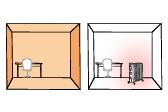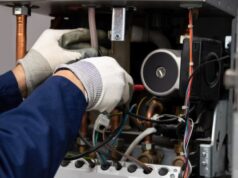
Heating is generally dealt with in terms of either heating a building, or heating a small space. These two scenarios require very different approaches and technologies.
There a several different ways to heat your home, and several different decisions you need to make before you select the right heater for your needs. The first thing you need to determine is whether you need space heating or central heating. Properly assessing your heating needs will help you to ensure that you’re getting the amount of heating you need, and not spending too much where you don’t need to.
What are space heaters?
Space heaters, which typically run on electricity or gas, are a localised heating source. Rather than taking a whole-house approach, space heaters are usually a single, self contained unit that connects to a wall plug or gas tap and emits heat to warm one area of the room. Some examples of space heaters include convection fan heaters, radiant bar heaters and oil-filled column heaters.
Space heaters (especially electric space heaters) normally start to produce heat very quickly and are especially well suited for providing heat in confined areas for short periods of time.

What is central heating?
Central heating offers a multi-room/multi-zone approach to heating. The ‘heater’ part is normally installed in a centralised location (perhaps in a garage or a cupboard), and distributes heat throughout your home via a series of ducts as warm air, steam or water, in the case of hydronic central heating.
Central heating is a whole-house approach, which requires a fair amount of work and overall cost in terms of installation, and which can normally be controlled so that it only heats certain parts of the house where it’s needed. Automated heating systems are most often connected to smart central heating systems.
Which one is right for me?
When it comes to choosing between space heating and central heating you need to carefully weigh up your heating requirements: How many rooms are you trying to heat? How cold does it get and how often? How much do you want to spend?
Space heaters are better suited to smaller, confined areas that are well-sealed, and generally won’t do a very good job of heating large rooms or rooms where heat can easily escape through windows or doors. Oil-filled column heaters are regarded as one of the safer options when it comes to portable space heating – and in most cases one of the cheaper ones to operate. The down side is that they don’t produce as much heat as convection fan heaters and radiant bar heaters, and they take much longer to get warm. Convection fan heaters and radiant bar heaters are considered by most to be a fire hazard though, especially when they’re covered, obstructed or left unattended. Portable heaters are cheap to run and produce plenty of heat, but they also require some ventilation to allow oxygen into a room, and can be dangerous if they’re not ventilated properly.
Central heaters, on the other hand, normally cost a lot more to purchase, install and to run, but are far superior to space heaters in terms of their ability to keep your house warm. That’s not to say that central heating is always the more expensive option though – in a well designed and insulated house, central heating may be cheaper than space heating in a poorly designed house.
The all-important cost
When it comes to cost, you really need to ask how often you’re going to be using it, and how much of the house needs heating. If you think you’re only going to need heating for a couple of weeks a year in one or two small rooms, it’s likely to be much more economical to heat those areas with space heating. If you live somewhere that’s colder or you need to heat many areas at once, central heating’s the obvious option. Likewise, if you have a big open living area you may find that most space heaters just aren’t up to the job.
Carefully designing a home to passively heat itself may cost more in the first instance, but over time you’ll be very happy you did so – especially with the rising costs of electricity and natural gas. If that’s not possible – think carefully about the option you choose and how much it’ll cost to run. Over time, a more economical system is likely to be the worthwhile option.





